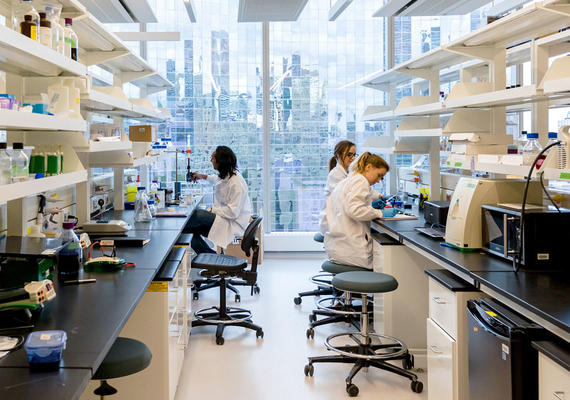
Welcome to the Department of Physiology & Pharmacology
As the largest basic science department in the Cumming School of Medicine, Physiology and Pharmacology and its members represent six of the School's seven research institutes - the Hotchkiss Brain Institute, the Snyder Institute for Chronic Diseases, the Libin Cardiovascular Institute, the Arnie Charbonneau Cancer Institute, the McCaig Institute for Bone and Joint Health, and the Alberta Children’s Hospital Research Institute for Child and Maternal Health.
The strength of the Department of Physiology and Pharmacology lies in our outstanding faculty, staff, postdoctoral fellows and students, all of whom take pride in a strong commitment to excellence in research and education. The mission of the Department of Physiology and Pharmacology is guided by core values of respect, integrity, and responsibility. The Department is strengthened by diverse backgrounds, perspectives, and experiences, and promotes a positive and productive environment committed to the principles of equity, diversity, inclusion, and accessibility. Our members actively engage in a culture that addresses barriers faced by equity-deserving groups including women, indigenous peoples, visible/racialized minorities, persons with disabilities, and LGBTQ2S+.
In fulfilling our mission, the Department supports the mandates of the Office of Equity, Diversity, and Inclusion, as well as the Office of Indigenous Engagement and the Indigenous Strategy [ii’taa’poh’to’p].
On behalf of our department, you are invited to explore our website. Don’t hesitate to contact us if you wish more information.
Research News and Events
Discover what our faculty have been up to!

Faculty Feature: Dr. Claire Arrieta and Lab
Over the past 3 years, Dr. Claire Arreita's research group has made significant strides in understanding the early-life gut microbiome, with a particular focus on the ecological mechanisms governing the establishment of the gut microbiome, as well the role of the understudied gut mycobiome on early-life health. These advances are driven by the outstanding work of our students and postdoctoral researchers, whose contributions have been central to our recent publications.
- Gut Mycobiome and Metabolic Health: Led by Dr. Mackenzie Gutierrez, our Nature Communications study established a causal link between core fungal species in the gut and host metabolic health. By integrating human cohort data with experimental models, this work provided critical mechanistic insights into how fungi interact with bacterial communities and host metabolism, expanding our understanding of the gut microbiome beyond bacteria.
- Microbiome Maturation in Infancy:
- Under the leadership of Emily Mercer (PhD student), our Microbiome paper presented a longitudinal analysis of bacterial and fungal microbiome development during the first year of life. The study demonstrated that bacterial and fungal communities follow distinct maturational patterns, influenced by inter-kingdom interactions and infant nutrition, with implications for long-term health.
- Building on this, Mackenzie Emily led our Cell Reports Medicine study, which revealed that early-life gut mycobiome trajectories are associated with infant body mass index. This work underscores the role of the mycobiome in metabolic programming and highlights the need to consider fungal communities in developmental microbiome research.
- Our Cell Host & Microbe study, spearheaded by Dr. Jumana Samara, examined the impact of probiotic supplementation on gut microbiome maturation in extremely preterm infants. The findings demonstrated that a probiotic mixture accelerated microbiome development while reducing intestinal inflammation, contributing to the growing body of evidence supporting targeted microbiome interventions in neonatology. This work is part of the BLOOM Study a birth cohort study led by our lab studying the microbiome and health outcomes of infants born premature.
- Reviewing Key Concepts in Microbiome Science:
- Dr. Thaís Glatthardt and Dr. Erik van Tilburg Bernardes led our Journal of Allergy and Clinical Immunology review, exploring the role of the mycobiome in the atopic march and how early fungal exposures may shape allergic disease risk.
- In Trends in Molecular Medicine, Dr. Parizadeh reviewed the global landscape of gut microbiome research, examining how lifestyle and diet shape microbial diversity across populations.
- Finally, Emily Mercer and I co-authored a Gut Microbes review critically assessing the current state of probiotics in neonatal care, emphasizing research gaps and future directions for improving gut health in preterm infants.
These studies reflect the dedication and innovation of our research team, highlighting the growing recognition of the gut mycobiome as a key player in health and disease. We are excited to continue building on these findings and mentoring the next generation of microbiome researchers.

Upcoming Events
Jan. 27, 2026
Department Business Meeting
January 27th, 2026
1:00 – 2:00pm
HSC G500
